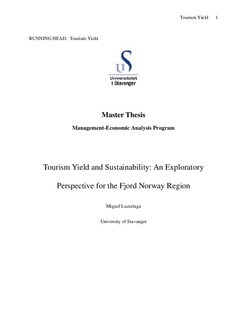| dc.contributor.author | Luzuriaga, Miguel | |
| dc.date.accessioned | 2011-01-24T09:15:58Z | |
| dc.date.available | 2011-01-24T09:15:58Z | |
| dc.date.issued | 2010 | |
| dc.identifier.uri | http://hdl.handle.net/11250/183805 | |
| dc.description | Master's thesis in Economic analysis | en_US |
| dc.description.abstract | “For the output of an economy to be sustainable it must generate sufficient income to meet all
costs of production and make investment such that at least a constant stock of capital is
maintained” (Becken & Simmons, 2008, p. 421). From this perspective, are the environmental
costs and the ecological capital considered? The dynamics of the current economies and the
pressures on achieving higher profitability have conducted to the industries in general; and the
tourism industry in particular to ignore environmental-sustainability issues. According to The
Living Planet Report 2008, the sustainability concept is one of the drivers for the solution of the
ecological overshoot (WWF, 2008). The consumption of the Biocapacity has become a major
concern due to the unbalances between the supply of ecological capital and the demands from
the economic activities. Since the tourism sector is an ecological capital industry consumer, the
knowledge conception around the environmental-sustainability assessment is crucial for the
industry’s sustainability. From an exploratory tourism yield assessment in the Fjord Norway
Region, we found that the visitors’ demand represented about 17% of the ecological supply
whereas the demand over the Biocapacity was increased due to the visitors’ shock producing an
overshoot of 57%. It represented a negative effect that in the absence of tourism would not occur.
It implied that if the population’s demands (summed to the visitors’ demand) continues at the
same rate, it will be required the equivalent of half of the Fjord Norway Region to maintain the
registered level of lifestyle consumption. Consequently, there is a necessity to develop
equilibrium models to maximize the tourism industry’s profitability ensuring that the ecological
capital remains productive indefinitely for the wellbeing of future generations. | en_US |
| dc.language.iso | eng | en_US |
| dc.publisher | University of Stavanger, Norway | en_US |
| dc.relation.ispartofseries | Masteroppgave/UIS-SV-IØL/2010; | |
| dc.subject | økonomi | en_US |
| dc.subject | administrasjon | en_US |
| dc.subject | økonomisk analyse | en_US |
| dc.title | Tourism yield and sustainability : an exploratory perspective for the fjord Norway region | en_US |
| dc.type | Master thesis | en_US |
| dc.subject.nsi | VDP::Social science: 200::Economics: 210::Economics: 212 | en_US |
| dc.source.pagenumber | 139 p. | en_US |
